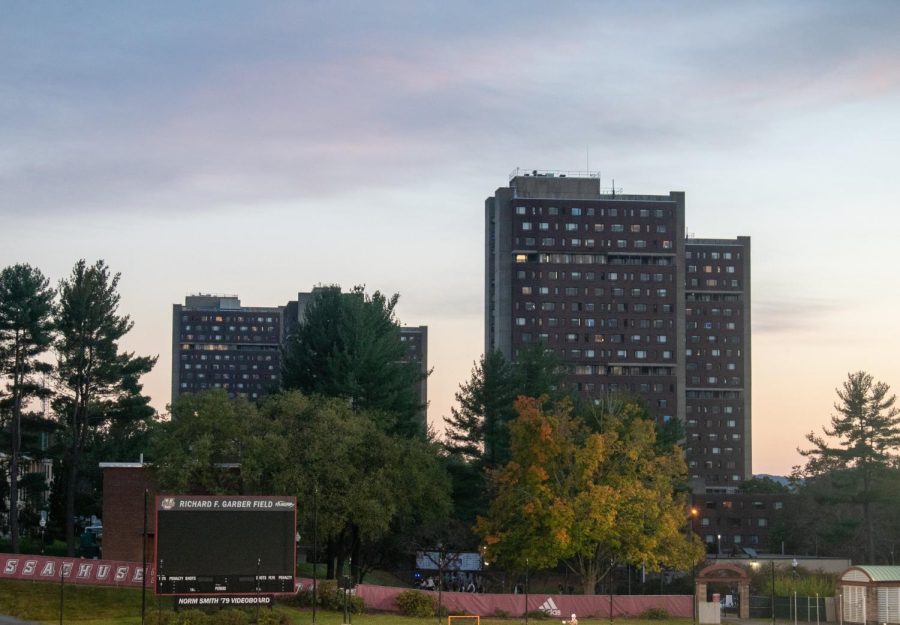On April 27, the Resident Assistant & Peer Mentor Union held a protest demanding higher pay from the University of Massachusetts. While I think it’s an important issue to tackle, I wish they were fighting for more mental health resources instead.
Being a residence assistant has given me the highest highs and the lowest lows over the past two semesters. Overall, I’m so grateful for my experience. I came into the job wanting to make a positive impact on first-year students, and from the warm messages on my white board to the fun conversations and cookouts with my residents, I can safely say I accomplished that.
But with those ups came a host of downs, because being an RA, you have to handle a lot of heavy topics. Dealing with racism, sexism, mental health, roommate conflicts and so many other personal subjects is all part of the job when you’re an RA. We’re trained for those situations before any residents move into the halls. Regardless of any training, though, these issues can take a toll on your own mental health, especially as they build up over time, or if you deal with a few tough situations in quick succession.
When you pair that with the typical day-to-day struggles of being a college student, the RA position can be too much to handle sometimes. And there’s no great way to take time off from the role. If you’re within driving distance of your hometown, you can go home for a weekend, which is encouraged by Residential Life staff. But not everybody has a means to travel home, and even if they do, it might not be an ideal option if you have schoolwork or weekend plans. But since RAs live in the building, the work never truly stops unless they spend a night elsewhere.
I believe the best resource for dealing with these ups and downs that become so mentally taxing is through therapy. De-stigmatizing professional help is something we should always be striving for, and counselling can be a great way to work through all the thoughts clouding your head. UMass offers free therapy sessions through the Center for Counseling and Psychological Health – which is so important and a great idea – but those free sessions are limited.
At CCPH, students get four free one-on-one sessions, or up to eight group sessions — you can mix-and-match the group classes (which count as half of an individual session), until the total adds up to four. But four one-on-one counseling sessions is simply not enough for those battling mental health struggles, which RAs are likely to be exposed to as part of the job.
UMass set a precedent that RAs can get certain benefits from the role. The largest of those is free, on-campus housing, but there are other small benefits as well, including reduced parking pass prices. I think additional free CCPH therapy should be considered as one of those benefits.
Some of my peers have issues with CCPH and in my own experience I’ve found it can be difficult to set up appointments. But setting any views, positive or negative, of the counseling center aside, CCPH is overall still a good resource that the University provides to students and one that residential life recommends to resident assistants dealing with heavy issues on the job.
The positive impacts of increasing the center’s accessibility to every RA at UMass would be tremendous. It would allow resident assistants to release some of the burden of stress caused by the job and could lead to a more positive impact on residents as a result because they’d be dealing with a less weighed-down RA.
My proposal to the CCPH would be to offer a weekly group class specifically for RAs, outside of the four allocated therapy sessions. This would allow RAs to still seek dedicated one-on-one counseling either for personal issues or issues related to the RA role, but it would also allow a dedicated space for RAs to come together and heal as a community that understands what the other people in the room are going through. This seems like a more realistic option than allowing unlimited counselling sessions to RAs, which would be the most ideal scenario.
RAs deal with a lot in their halls, and although I wouldn’t trade my experience as an RA for the world, I’m relieved to be leaving the role when the semester ends because it is too much for me. In the future, I hope UMass will take steps to help resident assistants deal with the mental impact this job has on them.
Colin McCarthy can be reached at [email protected] and followed on Twitter @colinmccarth_DC.





















Will • Aug 26, 2022 at 7:50 am
As a student that had some mental health problems during the past two years could totally relate. Posts with great suggestions like yours are really valuable. Also, those resources could be a great addition, too – https://ivypanda.com/blog/mental-health-resources/